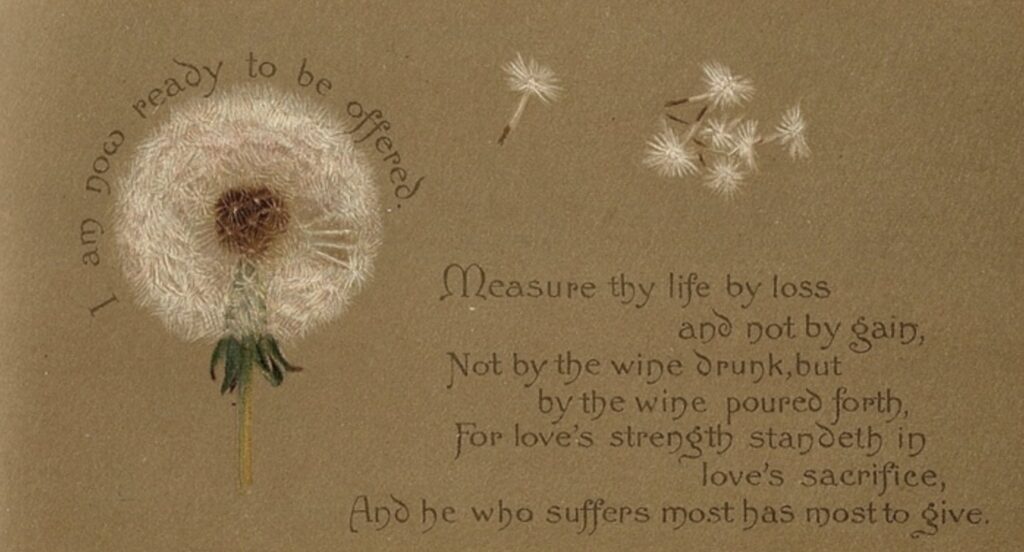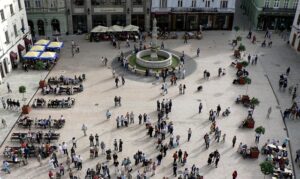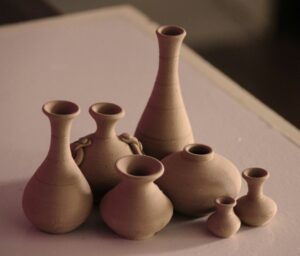In Nature Walking with God During Suffering, I write and reflect on God’s response to Job in chapters 38-42 after many previous chapters where Job and his friends deliberate why Job is experiencing such trials. God’s response is to take Job on a nature walk, showing him how He cares for creation. In my own suffering and trials, God has taken me on my own nature walks, using the dandelion as an illustrated sermon of the life of Christ and his journey of transformation on earth:
An almost invisible humble seed grows upward into a temporary public golden bloom, while also going downward into the dark earth. It dies and resurrects into a brief translucent globe, then breathed on by the wind of the Spirit, giving its seeds until it has nothing left, and then taken into unknown places to produce new life through humanity to display his glory.
As I reflect on the various seasons of suffering in my own life, beholding nature has been a spacious place of refuge and prayer with God that has brought healing and restoration for my soul. Like Job, I have spent time trying to understand the reason and role of suffering in my own life, while reflecting on the perplexity that it is in seasons of hardship or uncertainty where I have been drawn the most to Christ.
This paradox is the gospel – that suffering and death bring life, renewal, and restoration. The invitation to follow Christ means taking up our cross and following him, which leads us to share in His sufferings and His glory (Romans 8:17).
When I reflect on the suffering I have endured throughout my life, or when I think about the pain and trauma experienced by others I know or read about in the news, I ask myself, “did that thing really have to happen?” I recall the life of Job and ask, “did his children really have to die?” This is a fundamental question that can only find redemption through identifying with the cross of Christ. It’s not about finding out the why of hardships, it is about looking to Christ and walking with him in the trials, in the suffering, in the joys and the gifts of life. I find comfort in words of Dallas Willard.
Jesus did not die on the cross so that we don't have to. He died on the cross so that we may join him there.
Dallas Willard
In theory I know this statement is right, but in the moment, pain and suffering feels disorienting and sometimes devastating, because part of me wants answers and control. This is what is being pierced to the cross with Christ. This does not make the circumstances ok, but the part of me that wants to shake my fist at God and demand control or explainable answers slowly yields to God’s sovereign care and wisdom over all of creation.
As I read Job 38-42, I am reminded that God’s ways are higher than what my mind is capable of comprehending. I cannot fully understand God’s reasons for not fixing the suffering and evil in this world now, but I trust in the power of the resurrection to renew and redeem all things, and that God is good. My hope is that I am his child promised to share in His inheritance for eternity, and that “the present suffering is nothing compared to the coming glory that is going to be revealed to us” (Romans 8:17 CEB).
Lillias Trotter, an artist who was destined to be a prominent painter in the early 1900s, released a life of fame and embraced the Spirit’s call to Algeria to be an unknown missionary. She was also a beholder and painter of nature and says this about the dandelion. She says:
I am now ready to be offered, measure thy life by loss, and not by gain; not by wine drunk but by wine poured forth. For love’s strength standeth in love’s sacrifice, And he who suffers most has most to give.
Lillias Trotter

I have to read her words slowly. As I read them, something stirs deeply within and confirms it as truth that resonates with Scripture. Mysteriously, our suffering produces fruit, like grapes pressed that eventually turn into wine. We are transformed into Christlikeness in the crushing, but only if we yield our self-will and allow ourselves to be shaped and formed by God for however long it takes. I can resist this process, only to later hear Jesus’ invitation to take up my cross all over again.
I will not even try to explain a full theology of suffering, as there are many books written which cover its significance in our lives. And this also does not mean that we put up with evil, abuse, and the injustices of the world, but that in the process of becoming Christlike in the suffering, we look to the cross of Christ, and yield ourselves completely to Him in humility. How has God used suffering in your life to draw you near to Him and transform you into Christlikeness?




